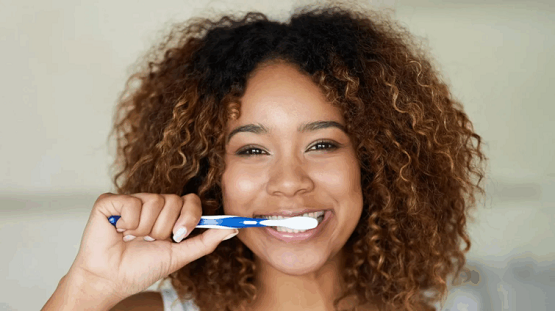We all think we know how to brush our teeth - a scrub morning and night, a rinse with water and maybe a minty mouthwash for good measure.
But according to dental experts, even the most diligent brushers might be making a few mistakes that could be undoing their good work.
Dr Praveen Sharma, from the school of dentistry at the University of Birmingham, says that half of adults in the UK will have gum disease at some point, and an early sign is bleeding gums.
"If your gums are bleeding or swollen, it's a sign you need to brush better," he says.
As well as regular dentist visits, here are four things he and BBC's What's Up Docs podcast hosts Dr Xand and Dr Chris van Tulleken say many of us are currently getting wrong, which, if we change, could improve the health of our teeth.
1. Brushing once well is better than twice quickly
It's one of the great dental commandments - brushing twice a day - and that's what the NHS recommends.
But Dr Sharma says the real key is quality, not quantity.
"If you can find time, then yes, twice a day," he says. "But it's better to do it once a day well rather than twice quickly."
If you are brushing once a day, then he recommends it be in the evening and make sure you also floss.
Of course, no one likes flossing, but Dr Sharma says using interdental brushes, particularly rubber ones, can make it easier and less painful.
When it comes to the method, each tooth has an outer, biting and inner surface, and all three need to be brushed.
Dr Sharma advises small circular motions over each surface without applying too much pressure. He also says to pay particular attention to the junction between the tooth and the gum as that's where gum disease can occur.
Dr Xand says it's important to "focus on the sensation of the bristles" and approach tooth brushing mindfully, not scrolling on your phone at the same time.
2. Brush before breakfast, not after
Many people brush their teeth right after eating, but that might not be doing your enamel any favours.
"Ideally, brush before breakfast," Dr Sharma says. "You don't want to do it after something acidic.
"If you do brush after, then you need to leave some space between eating and brushing."
That's because acids from foods and drinks, especially fruit juice or coffee, can soften tooth enamel and brushing too soon afterwards can wear it away.
Dr Chris suggests rinsing your mouth with water after eating to get rid of some acid and then waiting at least 30 minutes if you are brushing after breakfast.
3. Don't rinse after brushing
If you've been spitting, rinsing and gargling after every brush, you might want to rethink that last step.
"You spit but don't rinse," Dr Sharma advises. Rinsing your mouth washes away the concentrated fluoride in the remaining toothpaste.
That means simply spitting out the excess toothpaste and leaving the thin layer of fluoride behind to continue protecting your teeth.
4. Expensive toothpaste isn't better
With shelves full of whitening, charcoal, and enamel-boosting pastes, it's easy to assume the pricier options will give you a healthier smile.
But according to Dr Sharma, it doesn't really matter which brand you choose, as long as it contains one key ingredient.
"As long as your toothpaste has fluoride, it doesn't make much difference," he says, adding that he tends to buy whatever is cheaper or on offer.
Fluoride helps protect enamel and prevents decay, and that's what really counts.
BBC





